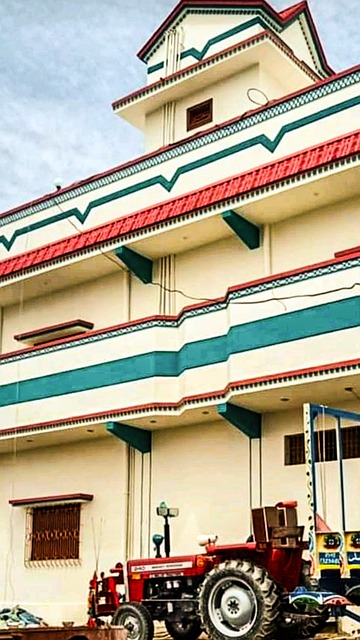In Karachi, property tax, or 'Imarak', is a vital revenue stream for the Korangi Municipal Committee (KMC), funding public services and infrastructure across the city's diverse areas. Calculations are complex, considering property value, size, location, type, age, and market trends. Tax rates vary by property type, with exemptions for non-profits, religious institutions, government properties, and low-income households. This tax is crucial for local governance and revenue generation, impacting the real estate market in Korangi and influencing homebuying decisions. Balancing tax policies with Karachi's socio-economic landscape promotes fair, sustainable growth.
In the bustling metropolis of Karachi, understanding property tax is crucial for both residents and investors. This comprehensive guide delves into the intricacies of property taxation in Korangi, one of Karachi’s vibrant areas. We’ll explore how property tax is calculated, who bears the burden, and what exemptions exist. Furthermore, we’ll analyze the impact of property tax on Korangi’s real estate market, providing insights essential for navigating this dynamic sector in Karachi.
Understanding Property Tax in Karachi: A Comprehensive Guide

In Karachi, understanding property tax is essential for both residents and prospective investors alike. Property tax in Karachi, often referred to as ‘Imarak’ or ‘Property Registration Fee’, is a local government levy collected by the Korangi Municipal Committee (KMC) to fund various public services and infrastructure development projects within its jurisdiction. This tax is based on the property’s value and size, with rates varying across different areas of the metropolis.
Karachi, being a bustling city in Pakistan, has seen rapid urbanization and real estate growth, which has also led to an increase in property tax revenue. The KMC evaluates properties through a comprehensive assessment process, considering factors such as location, age, construction type, and market value. This ensures that the tax is equitable and aligned with the benefits received by property owners from local amenities and services. Understanding these dynamics is crucial for taxpayers to ensure compliance and for Karachi’s continuous development.
How Is Property Tax Calculated in Korangi, Karachi?

Property tax in Korangi, Karachi, is calculated based on a complex formula that considers various factors related to the property’s value and characteristics. The process involves assessing the market value of the property, taking into account its location, size, type (residential, commercial, or industrial), age, and overall condition. Local authorities often employ professional appraisers to determine this value accurately. Once established, a tax rate is applied to compute the annual tax liability. Tax rates in Karachi can vary across different areas and property types, with residential properties typically having distinct rate structures compared to commercial real estate.
The calculation also considers any exemptions or discounts that might be available based on factors like property age, use, or even socio-economic considerations. These variations ensure a fair distribution of tax burdens within the diverse landscape of Karachi. The end result is a tailored tax assessment that reflects the unique characteristics of each property in Korangi and across the broader Karachi metropolis.
Who Pays Property Tax in Korangi and What Are the Exemptions?

In Karachi, particularly within the Korangi area, property tax is a significant aspect of local governance and revenue generation. The responsibility to pay property tax typically falls on the owner or legal occupant of the property. This includes residential, commercial, and industrial properties. The tax is calculated based on various factors such as the property’s location, size, age, and type.
Exemptions from property tax in Korangi are available for specific categories. These may include non-profit organizations, religious institutions, and government-owned properties. Additionally, certain low-income households or those with limited financial resources might qualify for tax relief programs. It’s essential for property owners to stay informed about these exemptions and apply where applicable to ensure fair taxation practices in the vibrant city of Karachi.
The Impact of Property Tax on Korangi's Real Estate Market

In the vibrant city of Karachi, particularly in its bustling sub-city of Korangi, property tax plays a pivotal role in shaping the real estate market. The introduction or adjustment of property tax rates can significantly influence both the demand and supply dynamics within this dynamic market. Homebuyers are typically sensitive to additional financial burdens, so changes in property tax policies often prompt them to reassess their purchasing decisions. A well-structured property tax system can incentivize responsible ownership while ensuring a steady revenue stream for local communities. This, in turn, can lead to better infrastructure development and amenities in Korangi, further enhancing its appeal as a desirable real estate destination in Karachi.
On the other hand, excessive or poorly implemented property taxes may inadvertently chill investment and growth. Property owners might become reluctant to invest in maintaining or improving their assets if tax burdens seem unfair or unpredictable. This could potentially lead to a decrease in property values and a slowdown in the market. However, a balanced approach that considers Korangi’s unique socio-economic landscape can foster a healthy real estate environment, where property taxes contribute to the area’s overall development while still allowing for fair and sustainable growth.
Property tax in Korangi, Karachi, plays a pivotal role in shaping the region’s real estate market. By understanding how it’s calculated and who bears the burden, residents can make informed decisions about their investments. The impact of property tax is significant, influencing both property values and the overall economic health of the area. As Karachi continues to evolve, navigating these taxes efficiently becomes crucial for both homeowners and investors alike, ensuring a sustainable and prosperous real estate landscape in Korangi.
